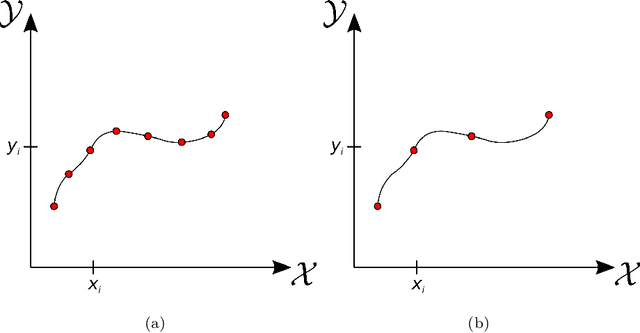Éric Savin
Divergence-Free Diffusion Models for Incompressible Fluid Flows
Jan 27, 2026Abstract:Generative diffusion models are extensively used in unsupervised and self-supervised machine learning with the aim to generate new samples from a probability distribution estimated with a set of known samples. They have demonstrated impressive results in replicating dense, real-world contents such as images, musical pieces, or human languages. This work investigates their application to the numerical simulation of incompressible fluid flows, with a view toward incorporating physical constraints such as incompressibility in the probabilistic forecasting framework enabled by generative networks. For that purpose, we explore different conditional, score-based diffusion models where the divergence-free constraint is imposed by the Leray spectral projector, and autoregressive conditioning is aimed at stabilizing the forecasted flow snapshots at distant time horizons. The proposed models are run on a benchmark turbulence problem, namely a Kolmogorov flow, which allows for a fairly detailed analytical and numerical treatment and thus simplifies the evaluation of the numerical methods used to simulate it. Numerical experiments of increasing complexity are performed in order to compare the advantages and limitations of the diffusion models we have implemented and appraise their performances, including: (i) in-distribution assessment over the same time horizons and for similar physical conditions as the ones seen during training; (ii) rollout predictions over time horizons unseen during training; and (iii) out-of-distribution tests for forecasting flows markedly different from those seen during training. In particular, these results illustrate the ability of diffusion models to reproduce the main statistical characteristics of Kolmogorov turbulence in scenarios departing from the ones they were trained on.
Physics-informed, boundary-constrained Gaussian process regression for the reconstruction of fluid flow fields
Jul 23, 2025Abstract:Gaussian process regression techniques have been used in fluid mechanics for the reconstruction of flow fields from a reduction-of-dimension perspective. A main ingredient in this setting is the construction of adapted covariance functions, or kernels, to obtain such estimates. In this paper, we derive physics-informed kernels for simulating two-dimensional velocity fields of an incompressible (divergence-free) flow around aerodynamic profiles. These kernels allow to define Gaussian process priors satisfying the incompressibility condition and the prescribed boundary conditions along the profile in a continuous manner. Such physical and boundary constraints can be applied to any pre-defined scalar kernel in the proposed methodology, which is very general and can be implemented with high flexibility for a broad range of engineering applications. Its relevance and performances are illustrated by numerical simulations of flows around a cylinder and a NACA 0412 airfoil profile, for which no observation at the boundary is needed at all.
Autoregressive regularized score-based diffusion models for multi-scenarios fluid flow prediction
May 30, 2025Abstract:Building on recent advances in scientific machine learning and generative modeling for computational fluid dynamics, we propose a conditional score-based diffusion model designed for multi-scenarios fluid flow prediction. Our model integrates an energy constraint rooted in the statistical properties of turbulent flows, improving prediction quality with minimal training, while enabling efficient sampling at low cost. The method features a simple and general architecture that requires no problem-specific design, supports plug-and-play enhancements, and enables fast and flexible solution generation. It also demonstrates an efficient conditioning mechanism that simplifies training across different scenarios without demanding a redesign of existing models. We further explore various stochastic differential equation formulations to demonstrate how thoughtful design choices enhance performance. We validate the proposed methodology through extensive experiments on complex fluid dynamics datasets encompassing a variety of flow regimes and configurations. Results demonstrate that our model consistently achieves stable, robust, and physically faithful predictions, even under challenging turbulent conditions. With properly tuned parameters, it achieves accurate results across multiple scenarios while preserving key physical and statistical properties. We present a comprehensive analysis of stochastic differential equation impact and discuss our approach across diverse fluid mechanics tasks.
Learning "best" kernels from data in Gaussian process regression. With application to aerodynamics
Jun 03, 2022



Abstract:This paper introduces algorithms to select/design kernels in Gaussian process regression/kriging surrogate modeling techniques. We adopt the setting of kernel method solutions in ad hoc functional spaces, namely Reproducing Kernel Hilbert Spaces (RKHS), to solve the problem of approximating a regular target function given observations of it, i.e. supervised learning. A first class of algorithms is kernel flow, which was introduced in a context of classification in machine learning. It can be seen as a nested cross-validation procedure whereby a "best" kernel is selected such that the loss of accuracy incurred by removing some part of the dataset (typically half of it) is minimized. A second class of algorithms is called spectral kernel ridge regression, and aims at selecting a "best" kernel such that the norm of the function to be approximated is minimal in the associated RKHS. Within Mercer's theorem framework, we obtain an explicit construction of that "best" kernel in terms of the main features of the target function. Both approaches of learning kernels from data are illustrated by numerical examples on synthetic test functions, and on a classical test case in turbulence modeling validation for transonic flows about a two-dimensional airfoil.
 Add to Chrome
Add to Chrome Add to Firefox
Add to Firefox Add to Edge
Add to Edge